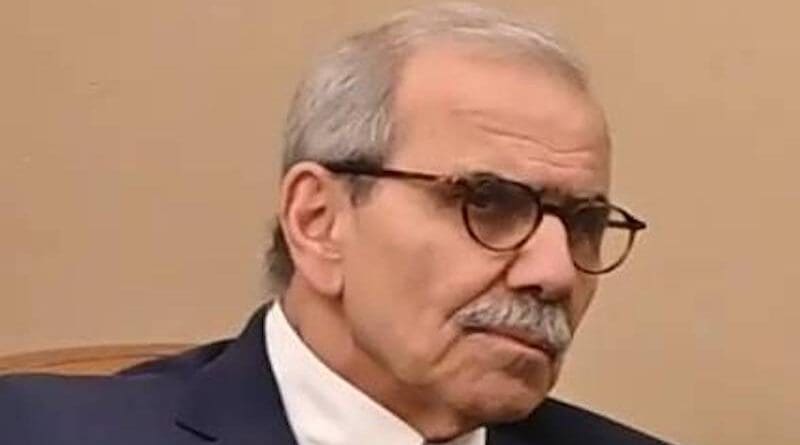ZIONISTS OUT!
Lebanon PM Demands ‘Full Israeli Withdrawal’

Lebanon’s Prime Minister Nawaf Salam. Photo Credit: ALGÉRIE PRESSE SERVICE, Wikipedia Commons
By Arab News
By Najia Houssari
Lebanon’s Prime Minister Nawaf Salam on Friday called for a complete withdrawal of Israeli forces from the country, and promised residents of border villages a safe return home and reconstruction of their properties.
Salam was speaking during a visit to the border area amid a partial Israel withdrawal.
However, Israeli troops continue to occupy five strategic hills in the region, blocking the road connecting the border areas.
Salam said on Friday that the Lebanese army “is carrying out its responsibilities to the fullest, reinforcing its deployment with determination and resolve to uphold stability in the south and ensure the safe return of our people to their villages and homes.”
He said that “the army is the entity in charge of defending Lebanon and accordingly, it should preserve the country’s security, protect its people, and safeguard its sovereignty and the unity and security of its territory.”
After his government won a confidence vote in parliament this week, Salam visited the army’s barracks in Tyre and Marjayoun, as well as Khiam and Nabatieh.
Ministers and Maj. Gen. Hassan Aoude, the acting army commander, accompanied the prime minister.
The visit came hours after Israeli Defense Minister Israel Katz claimed in a statement that “Israel has received a green light from the US to stay in the buffer zone in southern Lebanon.”
He said that “our forces will stay indefinitely in the buffer zone, south of Lebanon.”
The French Ministry of Foreign Affairs responded to the Israeli defense minister’s claims, saying that “the ceasefire agreement between Israel and Lebanon clearly stipulates that Israel must withdraw from the south, including the five strategic points.”
Salam was taken to the Benoit Barakat Barracks in Tyre by military helicopter.
The Lebanese PM and his delegation held a meeting at the sector’s headquarters with Brig. Gen. Edgar Lawandos, commander of the southern Litani sector in the Lebanese army.
Salam said that the government “is committed to supporting the Lebanese army, by expanding its manpower, upgrading its equipment and training, and improving service conditions, to enhance its defensive capabilities.”
He also condemned “any attack on UNIFIL,” in light of the Feb. 15 violence on the Beirut Airport road.
Protesters — angered by the denial of landing clearance for an Iranian plane — attacked a UNIFIL convoy heading to the airport, injuring the deputy commander and his escort, who were both taken to the hospital.
Salam said that “firm action” will be taken to arrest and hold those responsible to account.
“We are taking all necessary measures to ensure it does not recur,” he said.
Salam commended UNIFIL’s role as a peacekeeping force in Lebanon and the south since 1978, with “many of its members sacrificing their lives to fulfill its mission.”
He praised UNIFIL’s “close cooperation with the army and Lebanese authorities to implement UN Resolution 1701, to enhance the security and stability of Lebanon and the south.”
On Thursday, the Government Commissioner at the Military Court, Judge Fadi Akiki, charged 20 people, including four detainees and two minors, with involvement in the attack on the UNIFIL convoy.
The charges included “attempted murder of the convoy’s members by burning the vehicle, assaulting the security forces and forming a group to undermine the authority and steal money worth $29,000 that was in the wallet of the UNIFIL deputy commander who was leaving Lebanon and returning to his country at the end of his mission.”
Following his visit to the military barracks, Salam met with a delegation from the border town of Dhayra.
Residents staged a protest outside the barracks to voice their suffering to the prime minister over the Israeli forces’ incursions into their lands, especially the destroyed southern neighborhood.
Salam promised the delegation that ministers will work to ensure “a safe return to your homes as soon as possible, and a commitment to the reconstruction process for the residents to return with dignity.”
He said: “Before receiving the confidence vote, the government started to mobilize all Arab and international support to force the enemy to withdraw from our lands and the so-called five points; There is no real and sustainable stability without Israel’s complete withdrawal.”
From Khiam, where he surveyed the Israeli destruction, Salam said: “We will only accept the complete withdrawal of the enemy from Lebanon, as Israel has repeatedly violated our sovereignty and land.”
In Nabatieh, several protesters criticized the prime minister for failing to thank “the resistance and only expressing gratitude to the army in the south.”
Another protester questioned “the possibility of reclaiming the occupied hills through dialogue.”
Salam’s visit to the south coincided with further Israeli airspace violations over Lebanon, as Hezbollah held funerals for 130 people, including party fighters and civilians killed in Israeli airstrikes during the recent war.
Trucks carried dozens of coffins along the road to the towns of Aitaroun and Aita Al-Shaab on Friday.
Israeli forces stationed at border positions, meanwhile, carried out intensive patrol operations toward the outskirts of Aitaroun ahead of the funerals.
Israeli violations also extended to the Bekaa, with aircraft flying at low altitude over Baalbek and northern Bekaa.
On Thursday, airstrikes targeted a Hezbollah official and another person in a pickup truck in the city of Hermel, killing both.
Later, Israeli army spokesperson Avichay Adraee said that one of the victims was “Mohammed Mahdi Ali Shahin, a Hezbollah operative responsible for acquiring combat equipment along the Syrian-Lebanese border since the Israel-Lebanon agreements came into effect.”
He added: “Shahin was one of the key members of Hezbollah’s geographical unit overseeing Lebanon’s Bekaa region, which has recently been focused on transferring combat equipment from Syria to Lebanon.”

Arab News is Saudi Arabia's first English-language newspaper. It was founded in 1975 by Hisham and Mohammed Ali Hafiz. Today, it is one of 29 publications produced by Saudi Research & Publishing Company (SRPC), a subsidiary of Saudi Research & Marketing Group (SRMG).
Agence France-Presse
Feb 28, 2025
 I
ILebanese on Friday conducted a delayed burial in a border village for more than 90 civilians and fighters from the Hezbollah movement who died during the war with Israel that ended with a November ceasefire.
Under the truce, Israel had an initial 60 days, later extended to February 18, to pull out its troops from southern Lebanon, but it did not withdraw most of them until the later deadline.
In the heavily damaged town square of Aitaroun, the coffins arrived on four trucks, some covered in the yellow flag of Iran-backed Hezbollah, others in the national flag.
Flowers were scattered on top.
Sobbing women, dressed in black, gathered around the vehicles holding photos of the Hezbollah fighters or the movement's leader Hassan Nasrallah, killed by an Israeli air strike during the war.
The coffins were then transported to a cemetery where 95 graves were dug, each marked by a number.
The dead included 51 Hezbollah fighters, most of them killed in combat, and 31 civilians, including five children and 16 women, killed by Israeli strikes, according to a channel dedicated to the village on the Telegram app.
It added there were 13 people who had died of natural causes.
One of the mourners, Atef Khouzeirat, said an Israeli strike on a building killed his son Hussein, a volunteer with the Hezbollah-affiliated Islamic Health Committee.
"My son stayed for 56 days inside the building after his death, without rescuers being able to recover his body," Khouzeirat said. "Where is the humanity? Where are the human rights?"
Khouzeirat added that his son had studied radiography at university. "He was not a terrorist," but a volunteer "in the service of his country."
Hezbollah began firing rockets into Israel in October 2023, saying it was acting in support of Hamas in its war with Israel in Gaza. Nearly a year of low-level conflict escalated in September last year, with Israel sending in ground troops.
The ceasefire took effect on November 27, after more than a year of conflict killed more than 4,000 people. Reconstruction costs are expected to top $10 billion, Lebanese authorities have said.
No comments:
Post a Comment